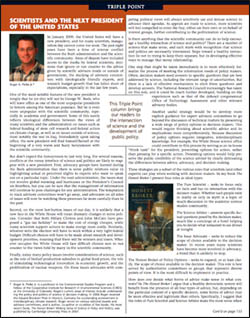Recent Publications
The following represents a sample of the numerous publications authored by Center staff. For a complete, searchable list, with online versions of most articles, visit our Publications page.
 Lahsen, M., 2008. Experiences of Modernity in the Greenhouse: A Cultural Analysis of a Physicist 'Trio' Supporting the Conservative Backlash Against Global Warming. Global Environmental Change, Vol. 18, No. 1, pp 204-219.
Lahsen, M., 2008. Experiences of Modernity in the Greenhouse: A Cultural Analysis of a Physicist 'Trio' Supporting the Conservative Backlash Against Global Warming. Global Environmental Change, Vol. 18, No. 1, pp 204-219.
Center research scientist Myanna Lahsen has a provocative new article out that analyzes a prominent subset of US climate contrarians, providing a more multi-faceted and complex account than generally available of why they chose to join the anti-environmental backlash. One of them, Frederick Seitz, died recently, making this a poignant time to examine him as well as his similarly influential colleagues in historical perspective, as she does in this article.
Abstract: In the context of President George W. Bush's rejection of the Kyoto Protocol intended to combat human-induced climate change, it appears important to improve understanding of powerful efforts to reframe global climate change as a non-problem. This paper draws on ethnographic research among U.S. scientists involved with climate science and politics to improve understanding of the U.S. controversy over global climate change by attending to structuring cultural and historical dimensions. The paper explores why a key subset of scientists – the physicist founders and leaders of the George C. Marshall Institute – chose to lend their scientific authority to the "environmental backlash," the counter-movement that has mobilized to defuse widespread concern about perceived environmental threats, including human-induced climate change. The paper suggests that the physicists joined the backlash to stem changing tides in science and society and to defend their preferred understandings of science, modernity, and of themselves as a physicist elite – understandings challenged by recent transformations in American science and society that express themselves, among other places, in the widespread concern about human-induced climate change.
 Pielke, Jr., R. A., 2008. Scientists and the Next President of the United States, Elements, Vol. 4, No. 3, June.
Pielke, Jr., R. A., 2008. Scientists and the Next President of the United States, Elements, Vol. 4, No. 3, June.
Excerpt: In January 2009, the United States will have a new president, and for many scientists, inauguration day cannot come too soon. The past eight years have been a time of intense conflict between the Bush administration and the scientific community. Areas of dispute have included access to the media by federal scientists, decisions that ignore or run counter to the advice given by scientific advisors inside or outside of government, the stacking of advisory committees with ideologically friendly experts, and research budget growth that has fallen short of expectations, especially in the last few years.
Also New:
-
Pielke, Jr., R. A., 2008. Blinded by Assumptions. Bridges, Vol. 17, April.
-
Pielke, Jr., R. A. 2008. Climate predictions and observations. Nature Geoscience 1: 206.
-
Pielke, Jr., R. A., 2008. End of 2007 Hurricane-Global Warming Update, AIR Currents, January.
-
Pielke, Jr., R. A., 2008. Overheated Claims. Financial Post, June 17.
-
Pielke, Jr., R. A., 2008. Trading technologies. Nature Reports Climate Change, online pub 29 May.
-
Pielke, Jr., R. A., Tom Wigley, and Christopher Green. 2008. Dangerous assumptions. Nature 452(3): 531-532. (see discussion of media coverage in Center News section).
-
Pielke, R.A., Jr., with contributions from P. Hoeppe (Munich Re) and S. McIntyre (climateaudit.org). Case studies in disaster losses and climate change.

